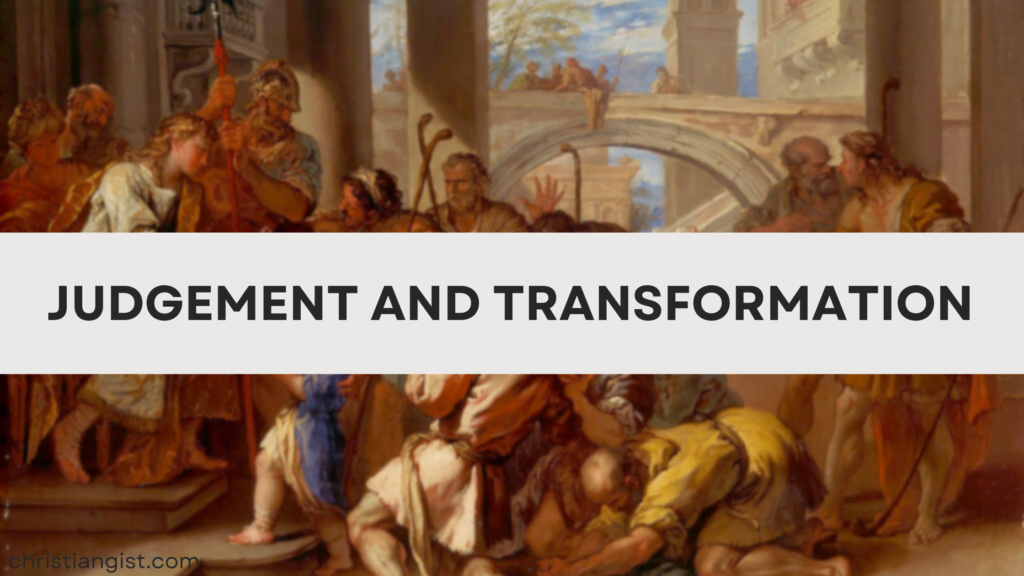Numbers are found throughout the Bible, serving not just as figures but as symbols with deeper meanings. Among these, the number 11 stands out, often associated with concepts of disorder, chaos, and judgment. But what exactly makes this number so significant in the biblical narrative? In this post, we’ll uncover the mysteries of the number 11, diving into its appearances in key biblical events and passages, and shedding light on its profound implications for believers today
The Meaning of The Number 11 in The Bible
The number eleven pops up in the Bible with a meaning that’s a little more complex than just messiness or problems. It can act as a sort of turning point, a signal that change is coming.
Think about the Israelites wandering in the desert (Deuteronomy 32:10-52). They were used to the structure of their lives back in Egypt, even as slaves – that’s kind of like the number 10. But eleven throws that order into question. It becomes this turning point where things get messy, but they have to go through that mess to get somewhere new.
You see this type of messiness in Numbers 11. The Israelites get tired of the same old manna and start craving meat. That’s their discontentment, their version of eleven – it’s forcing a change from the way things were.
Sometimes a little bit of messiness is what makes new things possible, right? By getting stuck in that space of eleven, the Israelites have to face all their doubts and wants head-on. It’s a tough process, but it gets them ready for that Promised Land, for a whole new way of life.
Maybe the number 11 in the Bible is about those tough, messy in-between times that happen before we really change and grow. It’s that uncomfortable phase where we’re not who we used to be, but not yet who we’ll become. It reminds us that sometimes, getting better means embracing a little chaos first. It’s not about being messed up, it’s about the hard work of becoming something new.
Biblical Significance of the Number 11
The number 11 appears throughout the Bible in diverse contexts, often associated with themes of disorder and judgment. In Genesis 11, we encounter the story of the Tower of Babel, where humanity’s attempt to reach the heavens results in God’s judgment, leading to the confusion of languages and the scattering of people across the earth. This narrative illustrates the consequences of human pride and rebellion, highlighting the theme of disorder brought about by disobedience to God’s will (Genesis 11:1-9).
Similarly, the reigns of certain kings in the Bible are characterized by the number 11, reflecting the turmoil and instability of their rule. For example, King Jehoiakim of Judah ruled for eleven years before his kingdom fell to Babylonian conquest (2 Kings 23:36-24:6). The brevity of his reign and the subsequent collapse of Judah underscore the consequences of disobedience to God’s laws and the judgment that follows.
Furthermore, the book of Revelation provides insight into the spiritual significance of the number 11. In Revelation 20:12-14, the apostle John sees eleven things associated with the final judgment, emphasizing the ultimate accountability before God for one’s actions. This depiction reinforces the idea of divine judgment and the consequences of moral disorder and rebellion against God’s authority.

The Number 11 and Chaos
The number 11 is closely linked to chaos and disorder throughout the Bible. Its appearance in various contexts serves as a reminder of the consequences of human sin and disobedience. In the story of the Tower of Babel, the number 11 symbolizes humanity’s attempt to usurp God’s authority and establish their own kingdom, resulting in divine judgment and the scattering of peoples (Genesis 11:1-9).
Moreover, the reigns of certain kings marked by the number 11 often end in turmoil and destruction, highlighting the instability and chaos that accompany disobedience to God’s will. King Jehoiakim’s eleven-year reign over Judah culminates in Babylonian conquest and exile, underscoring the consequences of moral disorder and rebellion against God’s laws (2 Kings 23:36-24:6).
Additionally, the association of the number 11 with chaos is further emphasized in the book of Revelation, where John sees eleven things in connection with the final judgment. This portrayal underscores the idea of divine judgment and accountability for one’s actions, highlighting the disorder and chaos that result from sin and moral rebellion (Revelation 20:12-14).
Appearances of the Number 11
The number 11 appears in various significant contexts throughout the Bible, providing further insight into its symbolic significance. One notable occurrence is in the discovery of the Dead Sea Scrolls, where eleven caves on the northwest shore of the Dead Sea yielded ancient manuscripts containing invaluable insights into Jewish history and theology. This association underscores the idea of revelation and divine intervention, as God’s word is preserved and revealed to humanity through these ancient texts.
Additionally, the absence of direct quotes from the Old Testament in eleven New Testament books highlights the thematic significance of the number 11. These books, including Philippians, Colossians, and Revelation, emphasize the idea of new revelation and spiritual insight, underscoring the transformative power of God’s word in the lives of believers.
Furthermore, the repetition of certain Old Testament passages eleven times in the New Testament, such as Daniel 12:1 and Isaiah 6:1, underscores their importance and relevance to Christian theology. These passages, which deal with themes of judgment and divine revelation, serve as reminders of God’s sovereignty and the consequences of moral disorder and disobedience.
11 Special Promises in the Gospel of John
The Gospel of John contains eleven special promises that offer hope and encouragement to believers. These promises, recorded by the apostle John, highlight the transformative power of faith and obedience to Christ’s teachings. Let’s explore each of these 11 promises:
- John 3:16 offers eternal life to believers in Jesus Christ, solidifying him as the sole path to salvation.
- Christ promises eternal life through spiritual connection, emphasizing the nourishment and fellowship found in communion with Him (John 6:54).
- Following Jesus promises liberation from spiritual darkness and ignorance, offering the “light of life” as described in John 8:12.
- Christ’s promise in John 8:31-32 – “If you abide in my word, you are truly my disciples; and you will know the truth, and the truth will make you free” – assures believers that unwavering faith unlocks spiritual freedom and liberation.
- Christ’s redemption, as promised in John 8:36, offers a transformative liberation from sin and spiritual bondage, granting true freedom.
- In John 12:26, Christ assures believers that faithful service earns divine honor, intertwining their devotion with his glory.
- John 14:12’s promise of “greater deeds” empowers believers, through faith and the Holy Spirit, to achieve works surpassing even Christ’s miracles.
- Believers who faithfully follow Christ’s commandments (John 14:15-16) are promised the Holy Spirit’s indwelling presence and guidance, assuring them of divine connection and support.
- John 14:21 promises reciprocal love between believers, Christ, and the Father, where obedience to Christ fuels love from both him and the Father.tunesharemore_vert
- In John 14:23, Christ promises believers intimate fellowship, requiring love and obedience to his teachings, revealing himself through their actions and hearts.
- In John 16:33, Christ offers believers an anchor of peace even amidst tribulations, reminding them of his triumph and their assurance in him.
Number 11 and Edom
The biblical narrative surrounding the number 11 also intersects with the historical enmity between Edom and Israel. Edom, the descendants of Esau, represents hostility and opposition to God’s chosen people throughout the Old Testament. The significance of the number 11 in relation to Edom is highlighted in the account of the eleven dukes or chiefs of Edom mentioned in Genesis 36:40-43.
These eleven leaders symbolize the earthly power and authority of Edom, which stood in opposition to the spiritual promises and blessings bestowed upon Israel. The enmity between Edom and Israel is rooted in the sibling rivalry between Jacob and Esau, as well as the historical conflicts between their respective descendants.
Furthermore, the symbolism of the number 11 underscores the spiritual implications of this enmity, as Edom represents the forces of darkness and opposition to God’s kingdom. Throughout the Old Testament, Edom is portrayed as a symbol of pride, arrogance, and hostility toward God and his people, culminating in divine judgment and the eventual downfall of Edom (Obadiah 1:1-21).
Moreover, the association of Edom with the number 11 serves as a reminder of the consequences of spiritual rebellion and opposition to God’s will. Just as Edom faced judgment and destruction for its hostility toward Israel, so too will all who stand in opposition to God’s kingdom ultimately face divine judgment and condemnation.
Relationship Between 11 and 22
The relationship between the numbers 11 and 22 in biblical numerology offers further insight into their symbolic significance. While both numbers carry distinct meanings on their own, they are also interconnected in their representation of spiritual truths and divine mysteries.
The number 11 is often associated with chaos, disorder, and judgment, highlighting the consequences of human sin and rebellion against God’s will. In contrast, the number 22 symbolizes spiritual mastery, revelation, and divine completion, signifying the fulfillment of God’s purposes and promises.
Moreover, the combination of these two numbers, 11 and 22, underscores the journey of spiritual transformation and growth experienced by believers. Just as the number 11 represents the chaos and turmoil of human existence, the number 22 signifies the restoration and renewal brought about by God’s grace and redemption.
In biblical numerology, the number 22 is often associated with significant events and figures that embody spiritual mastery and divine purpose. For example, the number 22 is linked to the 22 letters of the Hebrew alphabet, which serve as the building blocks of divine revelation and sacred scripture.
Furthermore, the number 22 is also associated with the 22 generations listed in the genealogy of Jesus Christ in Matthew 1:1-17, underscoring the fulfillment of God’s covenant promises and the establishment of his kingdom on earth.
The relationship between the numbers 11 and 22 highlights the tension between chaos and order, judgment and redemption, that characterizes the human experience. While the number 11 reminds us of the consequences of sin and disobedience, the number 22 offers hope and assurance of God’s faithfulness and grace.
Dark and Light Symbolism of Number 11
The contrast between darkness and light represented by the number 11 underscores the spiritual significance of this numeric symbol. Throughout the Bible, darkness is often associated with ignorance, sin, and spiritual death, while light symbolizes truth, righteousness, and divine revelation.
In the creation narrative of Genesis 1, God separates light from darkness, establishing order and beauty in the midst of chaos (Genesis 1:1-5). This imagery reflects the ongoing spiritual battle between good and evil, with light representing God’s presence and truth, and darkness symbolizing the forces of sin and deception.
Moreover, the association of the number 11 with darkness highlights the consequences of spiritual rebellion and disobedience. In the story of the Tower of Babel, humanity’s attempt to build a tower to the heavens results in divine judgment and the scattering of peoples, symbolizing the consequences of human pride and rebellion against God’s authority (Genesis 11:1-9).
However, despite the darkness and chaos that characterize the human condition, the Bible offers hope and redemption through the promise of salvation in Jesus Christ. In John 1:4-5, the apostle John declares, “In him was life, and the life was the light of men. The light shines in the darkness, and the darkness has not overcome it,” highlighting the victory of light over darkness through the person and work of Jesus Christ.
Furthermore, believers are called to be “children of light” who reflect God’s truth and love to the world (Ephesians 5:8). In Matthew 5:14-16, Jesus exhorts his followers to let their light shine before others, so that they may see their good deeds and glorify their Father in heaven, underscoring the transformative power of God’s light in dispelling spiritual darkness and bringing hope to a fallen world.

The 11th Tribe
The significance of the number 11 is further illuminated by the story of Joseph, the 11th child of Jacob and the firstborn son of Rachel. Joseph’s life embodies the themes of chaos, judgement, transformation, and divine providence that are associated with the number 11, serving as a testament to God’s sovereignty and faithfulness in the midst of adversity.
Joseph’s journey begins with jealousy and betrayal at the hands of his brothers, who sell him into slavery out of envy for his favored status with their father (Genesis 37:12-36). This act of betrayal plunges Joseph into a period of darkness and uncertainty, as he is taken to Egypt and sold to Potiphar, an officer of Pharaoh.
However, despite the chaos and injustice of his circumstances, Joseph remains faithful to God and eventually rises to prominence in Egypt, becoming the second-in-command to Pharaoh and overseeing the distribution of grain during a severe famine (Genesis 41:37-57).
Moreover, Joseph’s reconciliation with his brothers and their eventual relocation to Egypt symbolize the restoration and renewal that God brings about in the midst of human brokenness and sin (Genesis 45:1-15). In Genesis 50:20, Joseph declares to his brothers, “As for you, you meant evil against me, but God meant it for good, to bring it about that many people should be kept alive, as they are today,” highlighting God’s sovereignty and providential care in the midst of adversity.
Furthermore, Joseph’s role as a savior and provider for his family foreshadows the ministry of Jesus Christ, who comes to seek and save the lost and offer redemption and reconciliation to all who believe in him (Luke 19:10). In this way, Joseph’s life serves as a powerful testament to the transformative power of God’s grace and the fulfillment of his promises, even in the midst of chaos and uncertainty.
Omission of Obedience
The significance of the number 11 is also reflected in the spiritual implications of disobedience and rebellion against God’s will. Throughout the Bible, the consequences of disobedience are often portrayed through narratives of judgment and divine discipline, underscoring the importance of obedience and faithfulness to God’s commands.
In the story of the Tower of Babel, humanity’s disobedience and rebellion against God’s command to scatter and fill the earth results in divine judgment and the confusion of languages (Genesis 11:1-9). This narrative serves as a cautionary tale against the dangers of pride and self-reliance, highlighting the consequences of disobedience to God’s will.
Similarly, the reigns of certain kings marked by the number 11 often end in turmoil and destruction, highlighting the consequences of moral disorder and rebellion against God’s laws (2 Kings 23:36-24:6). King Jehoiakim’s eleven-year reign over Judah culminates in Babylonian conquest and exile, underscoring the consequences of disobedience and rebellion against God’s authority.
Moreover, the omission of obedience is reflected in the spiritual implications of seeing the number 11, which may serve as a reminder of the consequences of disobedience and rebellion against God’s will. In Deuteronomy 11:26-28, God declares, “See, I am setting before you today a blessing and a curse: the blessing, if you obey the commandments of the Lord your God, which I command you today; and the curse, if you do not obey the commandments of the Lord your God, but turn aside from the way that I am commanding you today, to go after other gods that you have not known.”
Furthermore, the narrative of the Israelites’ forty-year wandering in the wilderness serves as a cautionary tale against disobedience and rebellion, as an entire generation perishes in the desert due to their unbelief and faithlessness (Numbers 14:26-35). This narrative underscores the importance of obedience and faithfulness to God’s commands, even in the face of adversity and uncertainty.
More Info on the Biblical Meaning of 11
The biblical significance of the number 11 extends beyond its association with chaos and judgment to encompass a broader range of symbolic meanings. In both secular and biblical contexts, the number 11 is often associated with transition, change, and transformation.
In secular numerology, the number 11 is considered a “master number,” signifying spiritual enlightenment and intuitive insight. Similarly, in biblical numerology, the number 11 is often associated with revelation, spiritual awakening, and divine intervention.
One prominent example of the spiritual significance of the number 11 is its connection to the concept of spiritual gates or portals. Throughout the Bible, the number 11 is linked to significant events and transitions, symbolizing the opening of spiritual gateways or the unfolding of divine mysteries.
For instance, in the story of Jacob’s ladder in Genesis 28:10-22, Jacob sees a vision of a ladder reaching from earth to heaven, with angels ascending and descending upon it. This vision represents a spiritual gateway or portal through which God’s presence and blessings are manifested on earth.
Furthermore, the number 11 is often associated with moments of spiritual transformation and revelation in the Bible. For example, in Acts 2:1-4, the disciples experience the outpouring of the Holy Spirit on the day of Pentecost, marking the beginning of the Christian church and the spread of the gospel to the nations.
Moreover, the symbolism of the number 11 underscores the idea of divine intervention and supernatural revelation in the lives of believers. Just as God intervened in the lives of biblical figures such as Jacob, Joseph, and the apostles, so too does he continue to work in the lives of believers today, opening spiritual gateways and revealing his truth and glory.
Conclusion
The biblical significance of the number 11 reveals themes of chaos, transformation, and spiritual warfare. From the Tower of Babel to Joseph’s journey, it symbolizes trials, disobedience, and redemption. This numeric symbol underscores God’s sovereignty amid human brokenness.
The interplay of light and darkness highlights the victory of Christ. As “children of light,” we reflect God’s truth. Let’s embrace God’s grace and trust in His providence, knowing He brings beauty from chaos and redeems the darkest moments.

